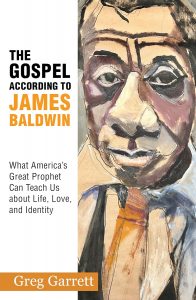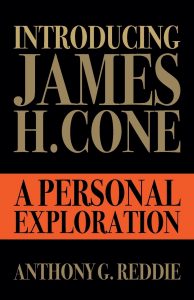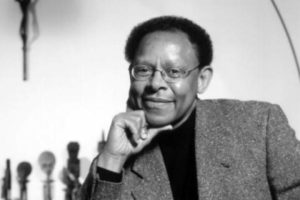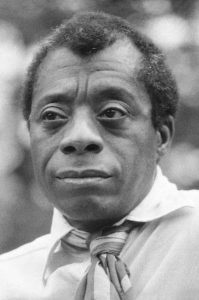Just as they did during the Civil Rights era, Black authors James Cone and James Baldwin are generating condemnation and inspiration in a nation increasingly divided over perspectives on race and justice, two panelists said during Baptist News Global’s latest “Change-making Conversations” webinar.
Cone, who died in 2018, is widely recognized as the inventor of the academic approach to Black theology. His 1969 book, Black Theology and Black Power, was hailed as prophetic within marginalized groups and vilified just as strenuously by white religious and political leaders, especially in the South.
Baldwin, who died in 1987, was an essayist, playwright and activist whose books, such as No Name in the Street, gave voice to the Civil Rights movement with scathing critiques of race and morality in the United States.
 What’s really sad and shameful is that these and other works by both men continue to be so painfully relevant in America well into the 21st century, said panelist Greg Garrett, a professor of literature and culture at Baylor University and author of The Gospel According to James Baldwin.
What’s really sad and shameful is that these and other works by both men continue to be so painfully relevant in America well into the 21st century, said panelist Greg Garrett, a professor of literature and culture at Baylor University and author of The Gospel According to James Baldwin.
“We are living in this age in which Baldwin speaks back to us,” he said. “And while I would love for us not to need him and James Cone in this vital way, both of these Jameses are speaking into 2023 in ways that are important and necessary.”
Introducing readers and viewers to the thought and writings of Baldwin and Cohen was the goal of the webinar, BNG Executive Director and moderator Mark Wingfield said.
“These are two names that get thrown around a lot today, both for good and for ill. It seems like everybody’s quoting these two folks again to make a point, one way or the other, and they’re either the source of all inspiration or the source of all evil, depending on your perspective,” he said.
While Garrett brought his expertise about Baldwin to the discussion, Anthony Reddie added his knowledge of Cone and liberation theology to the conversation.
 The author of Introducing James H. Cone: A Personal Exploration, Reddie recently was named the first professor of Black theology at Oxford University. He also serves as director of the Oxford Center for Religion and Culture at Regent’s Park College, which also houses the Center for Baptist Studies.
The author of Introducing James H. Cone: A Personal Exploration, Reddie recently was named the first professor of Black theology at Oxford University. He also serves as director of the Oxford Center for Religion and Culture at Regent’s Park College, which also houses the Center for Baptist Studies.
“I am passionate about Black liberation theology, justice and anti-racism,” Reddie said during the webinar held in a Dallas coffee shop as part of his preaching and teaching tour of Texas.
Meet James Cone
Wingfield asked Reddie to begin the dialogue with a description of Cone’s thought and theology.
“James Cone is my hero. He was born in Arkansas in 1938 into a Methodist family. He was part of the African Methodist Episcopal Church, and he’s credited as being the inventor or the initiator of the academic version of Black theology,” Reddie replied.
“Black theology was invented the moment the first enslaved person stood up to white supremacy and said that its version of Christianity was wrong.”
But Cone never accepted that credit, he added. “He always said he did not invent Black theology, but that Black theology was invented the moment the first enslaved person stood up to white supremacy and said that its version of Christianity was wrong, it was an abomination, it wasn’t of Christ. If anything, his argument was that the white Christ was the antichrist.”
It’s easy to see why many vehemently objected to Cone’s perspective, especially his assertion that white supremacy is America’s original sin and that it has distorted the nature and character of Christianity, Reddie said.

James Cone
“His argument was that we have a dispossessed, marginalized, oppressed figure called Jesus Christ. He was born in Nazareth in the midst of the Roman Empire as an oppressed Palestinian Jew. And yet, somehow across the course of some 1,500 years, that figure who’s oppressed and identifies with other oppressed people, now suddenly becomes a symbol for white supremacy.”
Rediscovering authentic Christianity requires swapping the Christianity tainted by white supremacy and entitlement for a faith focused on a God who freed slaves in Egypt, he said.
“Cone identifies Black theology as part of a liberating tradition that comes out of the Scriptures and out of a God who identifies with the oppressed and who finds expression in Jesus, who is executed not by the Jews, but by the Romans who are analogous to that form of oppressive power. Cone sees Rome as analogous with modern-day America in terms of being this imperial power that is focused on subjugating and oppressing people in order to assert its own sense of power.”
“What white Christians have essentially done is to focus on their own sense of entitlement and supremacy and turn God into an idol of whiteness.”
In his teaching and writings, Cone presses those themes home by urging mainstream Christians to consider why they ignore liberationist aspects of their faith, Reddie said. “He would argue that what white Christians have essentially done is to focus on their own sense of entitlement and supremacy and turn God into an idol of whiteness.”
Meet James Baldwin
Baldwin, on the other hand, was not a theologian but a “major figure in American literature and American history” whose 1963 book, The Fire Next Time, explored the consequences of racial injustice and spent 41 weeks on The New York Times bestseller list, Garrett said.

James Baldwin
He rose to such prominence that in 1963 U.S. Attorney General Robert F. Kennedy asked him to assemble a group of Civil Rights leaders. Kennedy’s goal was to demonstrate how much his brother’s presidential administration was doing for Black Americans and to argue that progress on race is, by political necessity, incremental, Garrett said.
But the meeting didn’t go well after Baldwin and other activists informed Kennedy that racism is a moral, not political issue. “The question is not what is possible given the makeup of the House or the Senate. The question is how are we going to get to this place of absolute moral clarity that this is wrong? Robert Kennedy reacted with the sort of white fragility that we come to expect when people are confronted with their possible racism or complicity with racism.”
“The question is not what is possible given the makeup of the House or the Senate.”
But Robert Kennedy eventually came around and wrote a speech for his brother, President John F. Kennedy, presenting racism as a moral issue.
Washington officials weren’t the only people Baldwin offended, Garrett said. “In No Name in the Street, he talks about how these senators and politicians in the American South, how their violent rhetoric had endangered Black people, how Black people were being killed and maimed because of it. And he said that is what that rhetoric was intended to do.”
Even some in the Civil Rights movement began to disparage some of Baldwin’s ideas, Garrett added. “Toward the end of his life, he suffered something of a critical decline in the way people thought about his writing. There were other, more strident and militaristic Black activists who did not like the fact that he still was looking at love and reconciliation as a way of bringing some sort of conclusion, if there is to be a conclusion, to the problem of race in America.”
Modern-day heroes and villains
Wingfield noted the writings of Baldwin and Cone have been revived in recent years by opponents and proponents of racial justice, with most of the resultant backlash aimed at Cone. “Why is he such a boogeyman?”
It’s because Cone was a prophet in the classical, biblical sense, Reddie said, which means he brings forth information few want to hear.
“Cone has been calling out white supremacy for the best part of 50 years and saying what most white churches do on a Sunday morning has nothing at all to do with Jesus of Nazareth, has nothing at all to do with the biblical tradition of justice, prophecy, righteousness, the Hebrew Scriptures and the Christian New Testament. Basically, he is saying it is an abomination and it is blasphemy. Obviously, when you are telling white people that essentially they are liars and hypocrites, you’re not going to win any friends.”
“Obviously, when you are telling white people that essentially they are liars and hypocrites, you’re not going to win any friends.”
Baldwin has engendered less hostility from modern-day racists because “he lived into irrelevance,” Garrett said. “Baldwin lived past his critical sell-by date. His later novels are not as well-known. Fire Next Time was a 1963 book. And so, he is sort of this sidelined lion.”
Yet the core of Baldwin’s thought stands in stark judgment of an age in which Texas and other states are banning books and outlawing the teaching of racism and racial history, Garrett said.
“Baldwin’s insistence throughout his life is on the importance of history, on the necessity to reckon with American history and how both whites and Blacks are trapped in this same dance of death until we can reckon with people who look like us, and begin to repair that history and repent.”
‘Always support the excluded’
Cone’s enduring message is always to support the excluded, Reddie said. “Cone always reminds us that we should be on the side of the underdog. We should be on the side of those who are marginalized. We should be on the side of those who are scapegoats.”
His greatest gift may have been to call out the surreptitiousness of white supremacy to the point that is seems normal, he added. “Cone was the first to say to white people that you need to reckon with whiteness, you need to deconstruct it so that rather than it being a symbol of oppression, it can be a perspective that sits alongside other perspectives.”
Reddie also offered a justice-related perspective that applies to the current war in Israel and Palestine and how to weigh the antisemitism and Islamophobia being generated by the conflict.
“I have no doubt that Jewish people have suffered and still do, and that they are oppressed. I accept that,” he said. “And the attack on Israel by Hamas was atrocious and terrible. And Israel has the right to defend itself.”
But Israel is essentially a superpower waging war not only against Hamas, which began the war, but also against the Palestinian people, he said. “To be clear, Hamas is terrible. But not all Palestinians are Hamas. So, when you talk about a war, it is a war between two unequal entities.”
Israel is conducting what amounts to a collective punishment for the action of Hamas, which violates United Nations standards, Reddie said. “In my own country, when we had the IRA (Irish Republican Army) bombing mainland Britain, what British government did not do is bomb the whole of Northern Ireland.”
Related articles:
A conversation with Anthony Reddie about the importance of James Cone | Opinion by Greg Garrett
Oxford names Anthony Reddie first professor of Black Theology
In the footsteps of James Baldwin: An excerpt from The Gospel According to James Baldwin | Opinion by Greg Garrett
How I learned to name my oppression — and my privilege | Opinion by Meredith Stone


